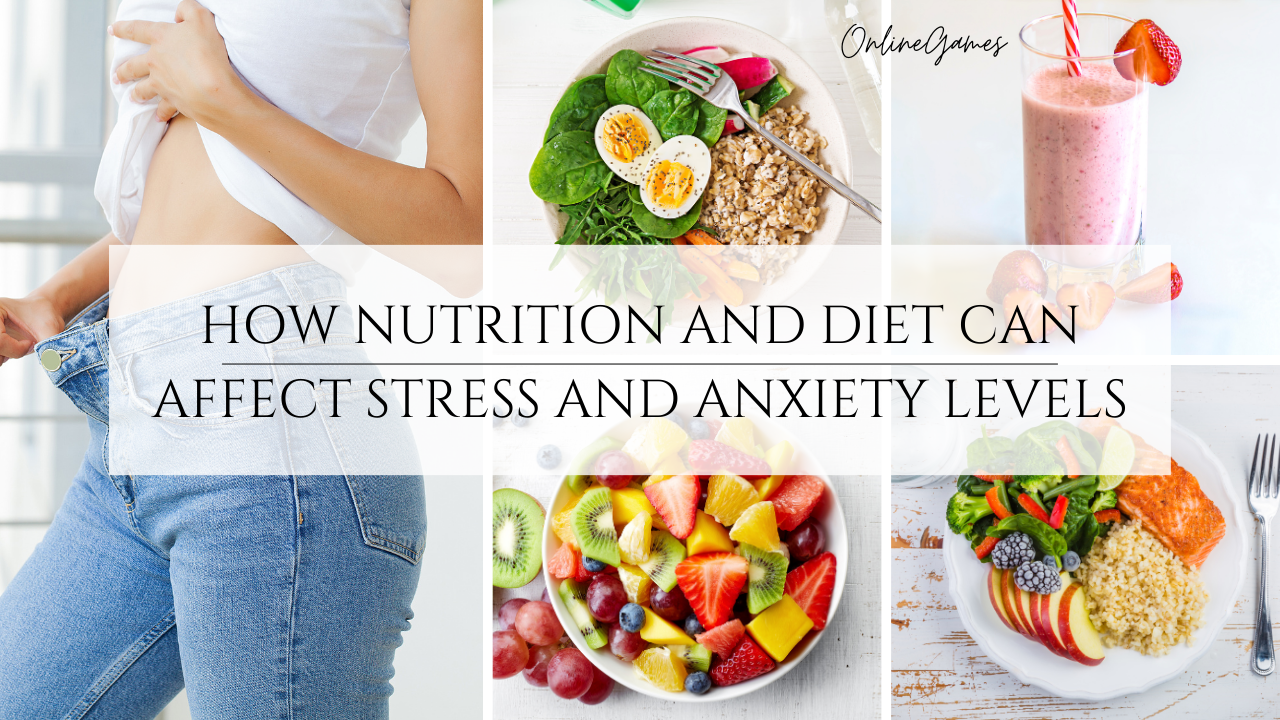In today’s demanding world, stress and anxiety have become common challenges affecting people of all ages. While many factors contribute to these conditions, nutrition and diet play a crucial yet often overlooked role in managing stress and anxiety levels. The foods we consume can significantly influence our mood, energy levels, and overall mental health. This article explores the connection between diet and mental well-being, highlighting the importance of making informed dietary choices to help mitigate stress and anxiety.
Understanding the Connection Between Diet and Mental Health
Nutritional Deficiencies and Mental Health
The human brain requires a variety of nutrients to function optimally. Nutritional deficiencies in essential vitamins, minerals, and fatty acids can lead to imbalances in brain function and neurotransmitter production, potentially exacerbating symptoms of stress and anxiety. For example, deficiencies in B vitamins, magnesium, and omega-3 fatty acids have been linked to increased anxiety and mood disorders.
The Role of Neurotransmitters
Neurotransmitters such as serotonin, dopamine, and gamma-aminobutyric acid (GABA) play a key role in regulating mood and emotional responses. These chemicals are directly influenced by the nutrients we consume. A balanced diet that supports neurotransmitter production and function can help maintain a stable mood and reduce the risk of anxiety and depression.
Key Nutrients for Reducing Stress and Anxiety
1. Omega-3 Fatty Acids
Omega-3 fatty acids are essential for brain health and have been shown to reduce symptoms of anxiety and depression. These fatty acids, found in fatty fish like salmon, mackerel, and sardines, as well as in flaxseeds, chia seeds, and walnuts, help to modulate inflammation and support the function of neurotransmitters involved in mood regulation.
Benefits of Omega-3 Fatty Acids:
- Reduce inflammation in the brain
- Support neurotransmitter function
- Enhance mood and cognitive function
2. B Vitamins
B vitamins, including B6, B12, and folate, are crucial for the production of neurotransmitters and for maintaining overall brain health. These vitamins help to convert food into energy and support the nervous system. Deficiencies in B vitamins can lead to increased feelings of fatigue and stress, as well as heightened anxiety.
Sources of B Vitamins:
- Leafy greens like spinach and kale
- Whole grains such as brown rice and oats
- Animal products like eggs, poultry, and fish
3. Magnesium
Magnesium is known as the “relaxation mineral” due to its ability to help regulate the body’s stress response. It plays a vital role in over 300 biochemical reactions in the body, including muscle and nerve function. Adequate magnesium levels can help reduce anxiety, improve sleep, and lower stress levels.
Sources of Magnesium:
- Nuts and seeds, such as almonds and pumpkin seeds
- Legumes like black beans and chickpeas
- Whole grains and dark chocolate
4. Vitamin D
Vitamin D is essential for overall health, including mental well-being. It helps regulate mood and protect against depression. Low levels of vitamin D have been linked to an increased risk of anxiety and mood disorders.
Sources of Vitamin D:
- Sun exposure
- Fatty fish, such as salmon and tuna
- Fortified foods like dairy products and cereals
5. Antioxidants
Antioxidants help to combat oxidative stress, which is linked to anxiety and depression. A diet rich in antioxidants can help protect the brain from damage caused by free radicals and support overall mental health.
Sources of Antioxidants:
- Berries like blueberries, strawberries, and raspberries
- Dark chocolate and green tea
- Vegetables such as broccoli and carrots
6. Probiotics
Probiotics support gut health, which is closely linked to mental health through the gut-brain axis. A healthy gut microbiome can improve mood and reduce symptoms of anxiety and stress.
Sources of Probiotics:
- Fermented foods like yoghurt, kefir, and sauerkraut
- Probiotic supplements
- Kimchi and miso
Foods to Avoid for Better Mental Health
1. Refined Sugars and Carbohydrates
Refined sugars and carbohydrates can cause rapid spikes and drops in blood sugar levels, leading to mood swings and increased stress. High sugar intake has been linked to inflammation and an increased risk of depression.
Examples of Refined Sugars and Carbs to Limit:
- Sugary drinks and snacks
- White bread and pastries
- Processed foods with added sugars
2. Caffeine
Caffeine can exacerbate symptoms of anxiety and disrupt sleep patterns, leading to increased stress levels. While moderate caffeine consumption is generally safe for most people, excessive intake can lead to jitteriness and anxiety.
Sources of Caffeine to Monitor:
- Coffee and energy drinks
- Some teas and sodas
- Chocolate and certain medications
3. Alcohol
Alcohol is a depressant that can disrupt the balance of neurotransmitters in the brain, leading to increased anxiety and mood disorders. While occasional moderate consumption may not pose significant risks, regular or excessive alcohol intake can have negative effects on mental health.
Negative Impacts of Alcohol:
- Disruption of neurotransmitter balance
- Poor sleep quality
- Increased anxiety and depression symptoms
4. Processed Foods
Processed foods often contain high levels of unhealthy fats, sugars, and additives that can contribute to inflammation and negatively impact mental health. A diet high in processed foods is associated with an increased risk of depression and anxiety.
Examples of Processed Foods to Avoid:
- Fast food and pre-packaged snacks
- Frozen meals and processed meats
- Foods with artificial ingredients and preservatives
Dietary Patterns for Stress and Anxiety Reduction
1. The Mediterranean Diet
The Mediterranean diet emphasizes whole, nutrient-dense foods, including fruits, vegetables, whole grains, nuts, seeds, and healthy fats from olive oil and fish. This diet is rich in antioxidants, fibre, and omega-3 fatty acids, which support brain health and reduce inflammation.
Benefits of the Mediterranean Diet:
- Rich in nutrients that support mental health
- Lowers inflammation and oxidative stress
- Promotes a balanced mood and reduces anxiety
2. The DASH Diet
The DASH (Dietary Approaches to Stop Hypertension) diet focuses on reducing sodium intake and increasing the consumption of fruits, vegetables, whole grains, and lean proteins. This diet has been shown to improve overall health and may also help reduce symptoms of anxiety and depression.
Key Components of the DASH Diet:
- Emphasis on fruits and vegetables
- Inclusion of whole grains and lean proteins
- Reduction of sodium and processed foods
3. Anti-Inflammatory Diet
An anti-inflammatory diet focuses on reducing foods that cause inflammation, such as processed foods and refined sugars, and increasing the intake of anti-inflammatory foods like leafy greens, berries, and fatty fish. Reducing inflammation can help improve mood and reduce anxiety.
Elements of an Anti-Inflammatory Diet:
- High intake of fruits and vegetables
- Inclusion of healthy fats like olive oil and nuts
- Avoidance of processed foods and added sugars
Practical Tips for Managing Stress Through Diet
1. Plan Balanced Meals
Balanced meals that include a variety of nutrients can help maintain stable energy levels and support mental health. Aim to include a mix of proteins, healthy fats, and complex carbohydrates in each meal.
2. Stay Hydrated
Adequate hydration is essential for maintaining cognitive function and overall health. Drink plenty of water throughout the day and limit the intake of caffeinated and sugary beverages.
3. Mindful Eating
Mindful eating involves paying attention to what and how you eat. Take time to enjoy your meals, eat slowly, and listen to your body’s hunger and fullness cues. This can help reduce stress and improve digestion.
4. Reduce Sugar Intake
Reducing sugar intake can help stabilize blood sugar levels and reduce mood swings. Opt for natural sources of sweetness, such as fruits, and avoid added sugars in processed foods and beverages.
5. Incorporate Relaxation Foods
Relaxation foods include those that naturally promote relaxation and reduce stress, such as chamomile tea, dark chocolate, and foods rich in magnesium and B vitamins. These foods can help support a calm and balanced mood.
Nourishing the Mind and Body
Nutrition and diet play a fundamental role in managing stress and anxiety levels. By making informed food choices and incorporating a variety of nutrient-rich foods into your diet, you can support your mental well-being and reduce the impact of stress on your life. Emphasizing whole foods, reducing the intake of processed and sugary foods, and following balanced dietary patterns like the Mediterranean or anti-inflammatory diet can help create a foundation for better mental health and overall wellness.










